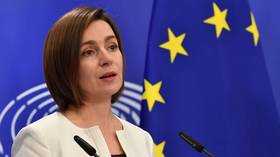
The ‘hostile’ move by Moldova won’t be left unanswered, the Russian Foreign Ministry has warned

Moldova’s President Maia Sandu speaks at the European Parliament in Brussels. © AFP / John Thys
By agreeing to abide by the EU’s sanctions against Russia, the government of Moldova has taken another “hostile step” aimed at the destruction of bilateral relations with the country, the foreign ministry in Moscow has said.
On Friday, the Moldovan parliament passed a law on the implementation of international restrictions on the territory of the former Soviet Republic. It was passed as part of reform measures supporting its bid to join the EU. Among other provisions, the new law allows for punitive actions to be taken against individuals and institutions subject to sanctions imposed on Russia over the conflict in Ukraine.
“We regard this as another hostile step by the Moldovan leadership, which is entirely integrated into the anti-Russian campaign of the West,” Russia’s Foreign Ministry spokeswoman Maria Zakharova said during a briefing on Friday.
The government of President Maia Sandu is working towards “a complete destruction of relations between Russia and Moldova, which, due to the actions of Chisinau, are already in quite a deplorable state,” she stressed.

Read more
Zakharova insisted that the “destructive course” pursued by the Moldovan authorities “hardly meets the interests of the country’s residents, who are overwhelmingly friendly towards Russia.”
The decision by Chisinau to join Brussels’ sanctions against Moscow “won’t be left unanswered,” the spokeswoman warned, adding that the specific measures are going to be announced at a later date.
Moldovan authorities have already been complying with most of the EU’s restrictions. A report by the European Commission earlier this month said that Chisinau’s alignment rate with the bloc’s common security policy, which includes the implementation of sanctions, stood at 78%.
Moldova, a small nation of 2.6 million sandwiched between Ukraine and Romania, has taken a distinctively pro-Western course since Sandu came to power in 2020. Her government has been actively pushing for membership of the EU and of NATO, going so far as banning critics and calling on Brussels to sanction those opposed to the idea. Chisinau has also fully backed Kiev in its conflict with Moscow, and has become increasingly critical of Russia’s actions.
Earlier this month, the European Commission recommended starting membership talks with Moldova and Ukraine.
READ MORE: Dog bites president
However, not everyone in the country appears to support Sandu’s leadership, with her Party of Action and Solidarity (PAS) securing only about 30% in November’s mayoral and county administrator elections. Notably, in every major city, including Chisinau, opposition candidates have gained the upper hand.




